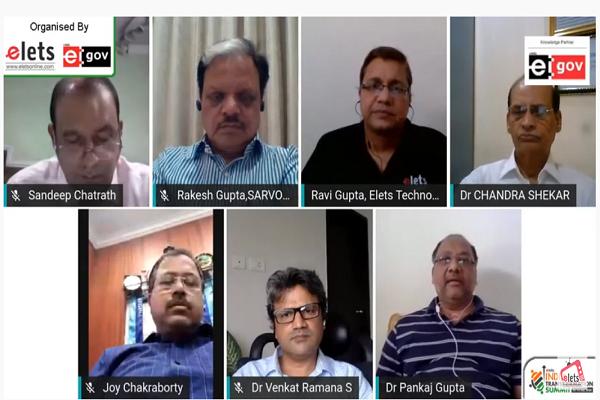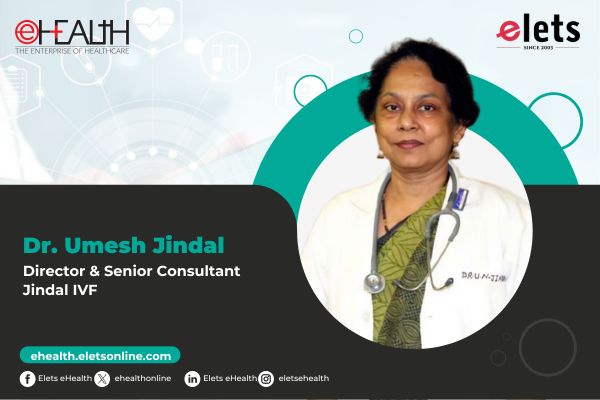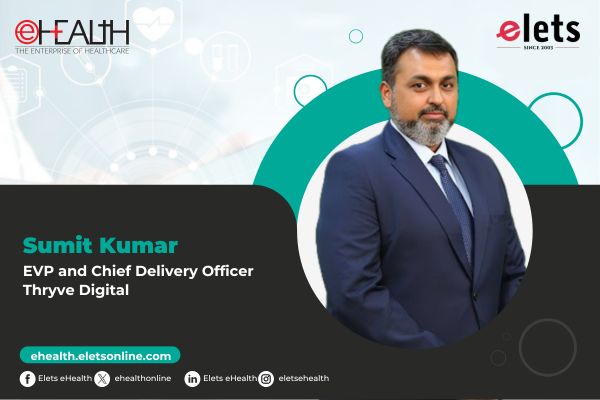
In an endeavour to deliberate on different aspects of healthcare system vis a vis ongoing corona pandemic, healthcare experts congregated at virtual healthcare innovation summit. Organised by Elets Technomedia, the Summit was a part of a three-day India Transformation Summit which witnessed key policymakers and experts discussing emerging governance challenges in the changing times. Prakash Kumar, Chief Executive Officer, Goods & Service Tax Network (GSTN), Government of India; Abhishek Singh, President & CEO, NeGD & MyGov, Ministry of Electronics & Information Technology, Government of India; Dr. Omkar Rai, Director General, Software Technology Parks of India (STPI), Ministry of Electronics & Information Technology, Government of India; Rajesh Aggarwal, Additional Secretary & Financial Advisor, Ministry of Petroleum & Natural Gas, Government of India; Krishnan Chatterjee, Chief Customer Officer & Head of Marketing, SAP India, were among key participants.
In the virtual healthcare summit, experts and industry leaders discussed about how they are tackling the ongoing challenges and strategy to provide quality care maintaining revenue cycle. Through various panel discussions, they threw light on existing challenges and strategic changes need to overcome the same.

Participating in a panel discussion on how the ongoing pandemic has affected hospital business, Dr. Shuchin Bajaj, Founder Director, Ujala Cygnus Healthcare Services, said: “Every industry went through with phase where they had lots of disruptions. In healthcare industry, we were over confident thinking that we were very low risk industry. Risk taking appetite of stakeholder was low. Nobody was actually ready to take that plunge towards transforming the industry completely. There were only incremental changes. There were no real transformative changes in the industry in last many decades.”



“Covid-19 has pushed the stakeholders to take the plunge. The crisis has pushed everybody off the cliff. Now we have no option but to build an aeroplane on the way down to avoid crash. In healthcare we have best digital minds, digital solutions providers, but struggled to provide telehealth solutions. This pandemic has pushed button a lot on telemedicine and consultation,: he further said.

Whimpering about minimum allocation to healthcare, Dr. D K Gupta, Chairman & Managing Director, Felix Hospital, said: “Covid-19 has affected healthcare in a significant manner. Our Government is investing too little—1.28 percent of GDP on healthcare while developed countries spend over 10 percent. Even WHO suggest it should be around 4-5 percent. Most of the hospitals including small, medium sized and tertiary care are bearing the brunt. In larger hospitals, medical tourism has gone down. In small and medium sized hospitals, OPD and elective surgery have witnessed sharp decline. Cash flow has interrupted. IPD, OPD, radiology have been affected except emergency care. There has been disruption of supply chain due to lockdown.”
Also read: 2018 Lays Foundation of Robust Indian Healthcare System
Another panellist Dr. Param Hans Mishra, Group Chief Executive Officer, Kailash Hospitals & Healthcare Ltd, highlighted issues of private stakeholders. He said: “This pandemic has pushed the healthcare industry in big turmoil. It has also brought to fore many challenges and opportunities towards us as healthcare managers and administrators. Cash flow has decreased as inflow of patients has gone down. Patients don’t want to visit hospital as they fear to catch corona infection. Number of elective surgery has gone down as well. Doctors and nurses are fighting with infection, risking their lives. We have devised strategies. We have segregated covid and non covid patients. Out of 10 hospitals we have dedicated one for covid patients.”
D S Chakravarthi, Chief Executive Officer, Prashanth Hospital, talked about contingency plan. “Till Covid-19 hit us hard, we never had any plan to deal with such situation. Those who have accepted the challenge and adapted accordingly have better chance to survive. We have to execute our changed business model in fast manner. We had planned for financial contingency to sustain in such kind of situation where there would be no or minimum business for some months,” he said.
“We leveraged telemedicine to provide services to our clients so that they won’t feel alienated. We tackled both covid and non covid patients. We looked upon threat as an opportunity. If we have to sustain then we have to strategise as per the situation and optimise processes and resources, accordingly,” he said.
Underlining the importance of innovative practices, Dr. Niraj Uttamani, Medical Director, Holy Family Hospital and Medical Research Center, said: “India has been hit hard by the pandemic. It has affected every sector including healthcare. Pay cuts and job loss have led to a very unstable situation in the healthcare sector. Healthcare is a hospitality industry where consumer is a patient. Emergency care can’t be deferred even in this pandemic. Covid-19 recovery will happen in see-saw manner. It will take many more months to back things on track.”
“Healthcare industry has to come up with absolute new innovations to cope up with new challenges. We have segregated covid and non-covid section as we have separate building. Same may not be possible for others. There has to be strategy to deal with different set of people as per their requirements vis a vis covid-19,” he further said.
Participating in another panel discussion on transforming healthcare ecosystem post covid-19, Dr. Rakesh Gupta, Chairman, Sarvodaya Hospital & Research Centre, said: “We faced challenge on front of supply chain—PPE kits, masks and all. Initially in Februrary, we didn’t have much to offer to covid patients. Then we started accumulating lots of global knowledge and we evolved soon. Then we created isolation facility, dedicated ultrasound, and ICU facility. Lockdown gave us time to prepare us well to provide better care to corona patients. With teams’ support, government facility, we provided best facility in Faridabad, Haryana. Tele consultations have its own limitations.”
Another panellist Dr. Venkat Ramana Sudigali, Director and CEO, Excell Multispeciality Hospital, opined that India beautifully tackled corona with lockdown proved very effective to strategise in better manner. “Lockdown in India has proved to be a good move in comparison to other countries. It provided time to prepare ourselves to take the pandemic head on. Stakeholders prepared themselves mentally and augmented infrastructural requirements. We are doing lot of remote consultations. Best part is that patients have started accepting it contrary to pre covid times. People will continue to avail teleconsulations post pandemic as well. Sometimes challenges bring up new opportunities as well and tele consultations is among one of them,” he said.
Talking about how his organisation has contributed to transform healthcare paradigm vis a vis corona, Dr Sandeep Chathrath, Regional CEO & Medical Director, Metro Hospitals & Heart Institute, said: “Covid-19 has totally transformed the healthcare scenario. The transformation has been 360 degree. Healthcare has become an essential core component of our country with impetus on infection control in a big way. We have observed supply chain management and clinical protocols for infection control as well as for the disease management. Metro has 11 hospitals and we have effectively implemented in all.”
“On the ground level, we have clinical management pathways for covid patients. Best thing is we have been able to control mortality rate and it is one of the best among various countries across the globe. We have also managed supply chain like availability of PPE and masks very effectively. Now, India is on its way to become manufacturing hub for PPEs,” he said.
Another panellist Joy Chakraborty, Chief Operating Officer, P D Hinduja Hospital listed steps undertaken to tackle patients. “We created a dedicated facility for corona patients and separate facility for non-covid patients as well. The month of April was little difficult to manage the scenario. But over a period of time, we have evolved and developed the system in such a way that peak come back to normal—slowly and steadily. Like most of the hospitals, we also have adopted tele consultations. We also provided home isolation facility to asymptomatic and aged patients. In addition, we also started 50-bed Covid care centre. It is one step below the dedicated covid hospital,” he said.
Dr Chandrashekhar T, Director, PD Hinduja Sindhi Hospital, said: “Occupancy and surgeries in the hospitals have dropped due to the pandemic. Non-covid patients have not been taken care of well by most of the hospitals. They were driving out non-covid patients. As a result death rate increased among such patients. Those patients could be easily saved by hospitals. Initially testing was an issue. But now we have PCR and rapid antigen testing too. We are taking care of both kinds of patients.”
Another panellist Dr Pankaj Gupta, Head Digital Health, Access Health International, termed data as key element to plan and strategise to cater patients with best facility. He also highlighted unorganised functioning of our care delivery system. He said: “Corona exposed the broken healthcare system. The system is falling short of number of beds, doctors, medicine, and supply. There is pretty much pressure on every part of the healthcare system today. The pandemic pushed us to the brink. We don’t know exactly about number of beds, para medical staff and other required information to get insight about the care delivery system.
“We need to optimise the process. Data becomes extremely important thing in such crisis like covid. Healthcare system also needs to evolve according to demand and expectations. Emphasis should be more on home healthcare services,” he held the opinion.
Be a part of Elets Collaborative Initiatives. Join Us for Upcoming Events and explore business opportunities. Like us on Facebook , connect with us on LinkedIn and follow us on Twitter , Instagram.
"Exciting news! Elets technomedia is now on WhatsApp Channels Subscribe today by clicking the link and stay updated with the latest insights!" Click here!
















